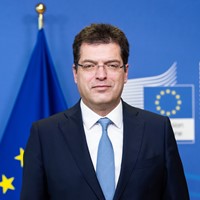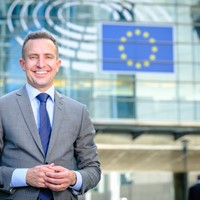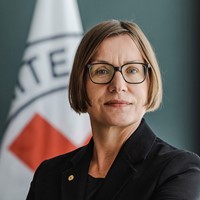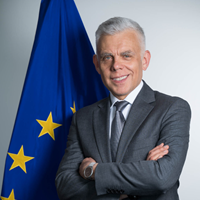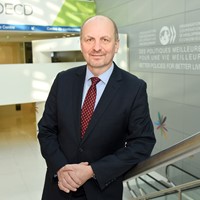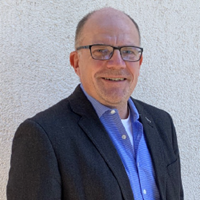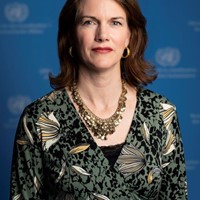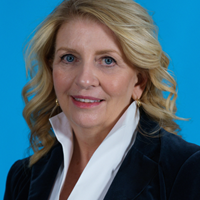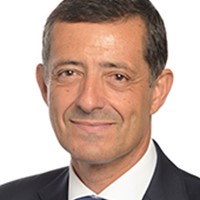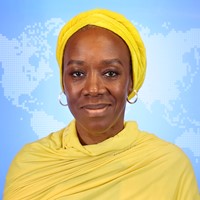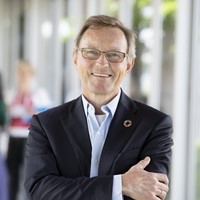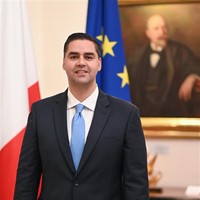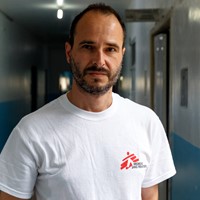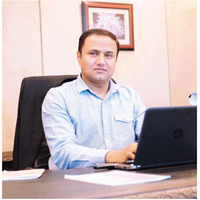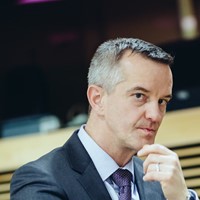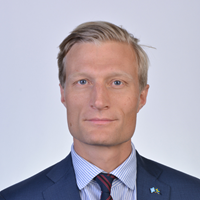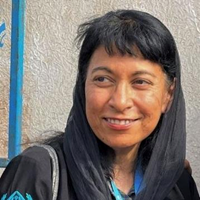Registration and Welcome Coffee
The opening ceremony of the European Humanitarian Forum aims to shed a light on the leadership and the contribution of the EU and its member states to humanitarian action. Keynote remarks will be delivered by Mr. Tomas Tobé (EU), Mr. Pekka Haavisto, Mr. Ikenna Azuike and Ms. Mirjana Spoljaric Egger (ICRC). HR/VP Mr. Josep Borrell will moderate the pledging session and invite all present EU Foreign Ministers to the stage to announce humanitarian funding pledges and priorities.
14 Foreign Ministers confirmed: Austria, Belgium, Croatia, Czech Republic, Estonia, Finland, France, Greece, Hungary, Latvia, Malta, Spain, Slovenia and Sweden; 6 Deputy Foreign Ministers confirmed: Bulgaria, Germany, Lithuania, Portugal and Romania
Coffee Break
Russia’s war in Ukraine: protracted crisis and challenges of principled humanitarian action
Auditorium
This session will focus on reaching a common understanding and sharing best solutions on how to ensure effective and principled humanitarian action in Ukraine.
The session will discuss how donors can maintain a principled humanitarian approach, while being politically not neutral, and how we can ensure funding for Ukraine in the medium and long term. It will evaluate the opportunities and challenges for Nexus in Ukraine and debate how we can make sure that the humanitarian response can pave the way to the next steps, i.e. early recovery, social safety nets, and reconstruction.
Overall, the session will draw and evaluate lessons learnt in Ukraine and provide recommendations for future principled and sustainable humanitarian actions.
Leading by example: One year into the Donor Declaration and charter on Climate and Environment
Aquarium
This session will take stock of the implementation of the Donor Declaration one year on from its launch at the European Humanitarian Forum 2022, and discuss how to bridge the needs expressed by the signatories of the Climate and Environment Charter.
The session seeks to reaffirm the commitment to the Donor Declaration from the signatories, namely helping humanitarian organisations to fulfill their own commitments enshrined in the Climate and Environment Charter for Humanitarian Organisations.
Localisation: The guidance on the promotion of equal partnerships with local responders
Studio
The Commission has set out its approach on strengthening equal partnerships with local responders around five pillars: 1) recognising skills and supporting capacities, 2) equitable partnerships, 3) participation throughout the humanitarian response cycle, 4) strengthening the leadership role of local and national humanitarian actors, 5) facilitating access to localised financing models. This session will discuss what good practices have been adopted by organisations and governments on these subjects and how can they be replicated. The session will also evaluate what actions are most relevant/effective for implementing durable solutions for localisation. Finally, the session will discuss how to move forward to support localisation at a global level, for example through alliances with other donors.
Lunch Break
Responding to an unprecedented global food crisis and averting famine
Auditorium
Putting IHL at the heart of external action: Ensuring accountability
Aquarium
Building on the first European Humanitarian Forum, as well as on the UNGA high-level event on accountability for sexual violence and other violations of International Humanitarian Law (IHL), this session continues the discussion on the means to improve monitoring of violations against IHL.
The session will discuss how the EU ensures that IHL is at the heart of its external action, and how EU Member States best can promote IHL. In addition, the session will evaluate how the ICC as well as preventive measures supported under ECHO’s Programmatic Partnership with the ICRC can promote IHL compliance in the current global context.
Safeguarding principled humanitarian action from the unintended negative impact of sanctions and counter-terrorism
Studio
This session will build upon developments in 2022 by addressing the unintended negative impact of sanctions and counter-terrorism, and present potential solutions to tackle practical challenges.
The session will incorporate voices from the field with the express purpose of highlighting the challenges under which humanitarian operators deliver humanitarian aid under sanctions or CT regimes. In this context, the session will discuss risk management by analysing the impact of humanitarian exemptions/derogations on increasing or lowering the risk of circumvention of sanction regimes. Finally, the session will debate the legal framework by narrowing in on the question of whether humanitarian exemptions/derogations facilitate an efficient delivery of humanitarian assistance and mitigate any potential unintended negative impact of sanctions regimes. Specifically, the session seeks to evaluate whether the harmonization of exceptions in sanctions regimes and their language facilitates the efficient delivery of humanitarian aid.
Coffee Break
The session aims to identify the operational challenges faced by frontline humanitarian workers in better engaging on access, as exemplified by field experiences. It will also outline the advantages of a more systemic and structured approach to strengthening the capacity of country-level humanitarian leadership on access negotiations. The discussions will focus on joined-up approaches among humanitarian and political actors to strengthen the use of humanitarian diplomacy for access while ensuring respect for the humanitarian principles and encouraging States to fulfil their obligations under International Humanitarian Law. Furthermore, the session will analyse how to design humanitarian access strategies in a way that enable accountability to affected populations and facilitate the access of crisis-affected communities to protection services and support.
Reaching those who suffer most: Understanding severity of needs
Aquarium
This session aims to build awareness and commitment to the analysis of severity of needs as a precondition for principled, transparent and accountable prioritization of the humanitarian response. The session will discuss what we can learn from current efforts to understand severity of needs (e.g. IPC, JIAF, GPC, UNHCR-WFP Joint Hub on Targeting), and what we still need to put in place to secure a severity of needs analysis that allows for effective prioritization. Ultimately, the session will bring forward recommendations for humanitarian partners on expanding and deepening severity of needs analysis and connecting it with decision-making around prioritization, including between crises.
Unlocking efficiency through flexible funding: Responding to new needs and changing operational contexts
Auditorium
This workshop will provide a platform for discussion on good practices as well as barriers to the promotion of multiannual and flexible funding. It will evaluate what good practices in flexible funding are, and how these can be showcased to provide donors with an enhanced scope and incentive to increase this kind of financing. The discussion will also bring attention to the value of flexible funding by international aid organisations in relation to local partners. Finally, the efficiency gains unlocked through flexible funding, as well as the impact of improved reporting, transparency and visibility from agencies and NGOs will be discussed.
The situation of women and girls in humanitarian crises: How to uphold the humanitarian principles whilst preventing a humanitarian catastrophe? The case of Afghanistan
Auditorium
Networking Cocktail
Riverside
Mitigating climate-driven disasters: Scaling up resilience and anticipatory action
Auditorium
The session will highlight the impact of climate change on at risk communities and identify gaps in the resilience of communities to climate shocks. It will investigate the importance of all actors across the Humanitarian-Development-Peace Nexus to ensure a holistic approach to building resilience to shocks. The session will investigate actions that Nexus actors could take to support at risk communities to build their resilience to climate shocks, and will also discuss the role of anticipatory action in addressing the impacts of climate change.
What can donors do to support a more effective and efficient humanitarian supply chain?
Studio
The humanitarian community has long recognised the need to update its approach to logistics to support a more efficient and effective delivery of aid, and to reduce the carbon footprint and environmental damage of aid delivery, in line with the Do No Harm principle. This session will focus on the role of donors in supporting a more efficient and effective humanitarian response; the greening of humanitarian aid; and in raising the profile of humanitarian logistics. It should foster a discussion on the interest for donors to invest on logistics, the best practices and potential ways forward to enhance a paradigm shift in the sector.
Fleeing for survival: Human mobility and Forced displacement in Latin America and the Caribbean
Aquarium
While the humanitarian consequences of the Venezuela crisis, both in the country and in the region have made the headlines in recent years, the objective of the panel is broader since it intends to highlight the humanitarian consequences of population mobility in Latin America and the Caribbean, focusing on internal & international displacement caused by the widespread violence and other humanitarian crises in different countries of the region.
The discussion is aimed at analyzing the challenges across the Latin America and Caribbean region and provide recommendations enabling an appropriate humanitarian response in terms of coordination, resources, and humanitarian access.
Coffee break
Soaring humanitarian needs and limited resources: Engaging emerging donors and new sources of financing
Auditorium
This session discusses a new “humanitarian narrative” in which humanitarian aid is framed as an investment and a common good. This narrative is framed by the ever-growing gap between resources for humanitarian assistance and humanitarian needs. . How new sources of funding (i.e. development and climate funding) can be mobilized will be discussed. In this context, the session will also debate how to get more concrete commitment from aid organizations to provide assistance in a more efficient and effective manner, working together much stronger and distributing tasks more systematically in line with their core strengths. Finally, the session will seek the support of minimum benchmarks for national humanitarian budgets with the objective of additional and more balanced humanitarian funding.
Protection of Civilians and Humanitarian Civil-Military Coordination
Studio
This session seeks to increase awareness on mainstreaming of Protection of Civilians (PoC) by the UN and EU peace/security actors and on the complementarity of PoC with humanitarian protection. It will discuss the key lessons learnt and best practices derived from the engagement with military/peace actors on mainstreaming Protection of Civilians in EU CSDP missions and operations, and UN peacekeeping missions. In addition, it will debate the current gaps and challenges to protecting civilians in complex emergencies. Finally, the session will discuss how Civil-Military Coordination can facilitate protection outcomes in contexts of shared humanitarian and military/peace presence.
Stepping up the Commitment to Conflict-Affected Children: Working across the Humanitarian-Development-Peace Nexus
Aquarium
This panel will focus on children at risk of, associated with, and formerly associated with armed forces and armed groups and. In particular, the panel will discuss how to best prevent these children’s recruitment and use, and support their reintegration through a Humanitarian-Development-Peace Nexus perspective. The discussion will highlight ways in which children are negatively impacted by their recruitment and use by armed actors and their differentiated needs based on age, gender and disability status. It will furthermore give concrete recommendations for updating the EU Guidelines on CAAC as well as their Implementation Strategy.
Lunch Break
Saving lives with limited resources: The need to prioritise
Auditorium
This session aims to secure greater commitment to transparent and accountable prioritization of humanitarian action by directing resources towards the most acute needs. The session will discuss how donors and humanitarian organizations can best prioritize their work in the face of today’s overwhelming needs and limited resources. At the same time, it will evaluate why some of the world’s most severe crises remain stubbornly underfunded and what tools are needed for more informed and transparent prioritization within and between crises. The session will furthermore debate the terms “vulnerability” and “humanitarian”, asking what the advantages and disadvantages of using these terms are. Finally, the session will evaluate what happens with the much-needed work on prevention and anticipation of crises, and the resilience of affected communities, if we agree to target scarce humanitarian funds more narrowly towards life-saving activities.
Boosting synergies for humanitarian action and civil protection in crisis response
Aquarium
This session will showcase concrete examples of successful cooperation and synergies between humanitarian action (HA) and civil protection (CP) and discuss how these examples can be replicated in other contexts. The session will debate the current level of integration of HA and CP actions and highlight the tools that are available to create synergies at EU-level (e.g. HA funding, EHRC, UCPM, rescEU, and ERCC). Finally, the session will analyse how other actors, such as member states and regional disaster management organizations, manage and contribute to the interactions between the HA and CP, and showcase what the benefits to these interactions are, seen from the perspective of humanitarian partners.
The challenges of humanitarian negotiations and principled response. How far are you ready to go to save lives? The case of Yemen
Studio
This session aims to explore how we can reinforce unity in the humanitarian community when negotiating and maintaining a principled approach in challenging operating environments such as Yemen. The session will discuss questions like :
- How far are humanitarians ready to go to have access and save lives? What is the reality of red lines in practice?
- Why is it difficult for humanitarians to maintain a united position in humanitarian negotiations? What have we done well so far in maintaining a united position?
- What should we improve in the future?
Through these questions the session strives to learn from the Yemen experience and research, reinforce good practices such as the SOM process, and generate concrete recommendations to improve the coordination of humanitarian negotiations.
Coffee Break
Strengthening synergies between humanitarian and development actors in protracted and complex crises
Auditorium
This high-level session will explore new modalities for engagement by development actors in protracted and complex humanitarian crises, including where traditional modes of engagement with national authorities are not feasible. Donors, development and humanitarian organizations and policy experts will discuss what new mechanisms may be needed to sustain basic services over time in complex crises; what principled and effective engagement with local authorities and communities could look like in politically estranged contexts; and how development, humanitarian and political approaches can be combined to tackle to root drivers of protracted crisis while addressing people’s immediate needs.
Protection in urban warfare: Reducing risk to civilians, civilian infrastructure and humanitarian workers in conflict
Aquarium
This session aims to raise awareness of the humanitarian consequences of urban warfare, including of the use of Explosive Weapons in Populated Areas (EWIPA). It will discuss how to address the complex protection challenges of civilians and civilian infrastructure. In this context, it will debate the best practices to protect civilians and key infrastructure, both through preparedness and response. The session will also present concrete steps that need to be taken by various actors (states, donors, international organizations, civil society) in order to use the momentum created by the Political Declaration on EWiPA in November 2022 and contribute to its meaningful implementation, with regards to several aspects such as collecting data on harm, victims’ assistance, addressing the reverberating effects and protecting civilians through adapted military practices.
Making better use of science to respond to climate-induced disasters in a humanitarian aid context: The role of Early Warning Systems
Studio
The aim of the session is to discuss the importance of early warning systems in informing decision-making, mitigating impact of disasters and fostering preparedness action as well as to re-position ‘early warning and action’ not only as a humanitarian topic, but also as a development and climate issue. With climate-related disasters displacing more people than conflict, UN Secretary-General António Guterres launched a plan post COP27 to ensure that everyone on the planet is protected by early warning systems within the next five years (Early Warning for All initiative). In this context, the session aims at examining what are the challenges and gap of early warning systems and what critical investments are needed in the respective pillars of the Humanitarian-Development-Peace nexus to build effective early warning systems. Furthermore, the session will discuss the ways the aid community could engage with local authorities and/or communities to co-design an effective and innovative early warning system reaching the exposed people and enabling them to react appropriately. Last but not least, the session aims to raise awareness on the existing early warning systems at global level that could support the humanitarian aid community to better prepare for and respond to disasters.
Networking breakfast – partners and DG ECHO management
Riverside
Opening remarks
Auditorium
Session 1: Minimum Environmental Requirements
Studio
Session 2: Quality Funding
Auditorium
Coffee/tea break
Riverside
Q&A with Commissioner
Auditorium
Session 3: Localisation – Equitable partnerships in practice
Auditorium
Closing remarks

